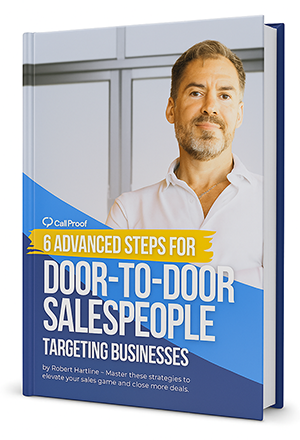
CallProof CRM is The Original Mobile CRM for Inside and Outside Teams. Simple to use CRM packed with completely customizable features. CallProof CRM works with Gmail, G-Suite, Outlook and many more applications
- 4235 Hillsboro Pike, Suite 300 #608 Nashville, TN 37215
- 877-283-8181
- sales@callproof.com
SUPPORT
Email Support:
support@callproof.com
Free eBook
Grab our FREE ebook
6 Advanced Steps for
Door-To-Door Salespeople Targeting Businesses.
Discover proven strategies to overcome common challenges, connect with decision-makers, and close more deals in B2B sales!
© Copyright CallProof, LLC. All rights reserved.

